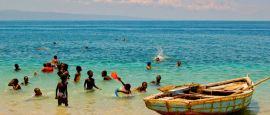Haiti History, Language and Culture
History of Haiti
In 1492 Christopher Columbus became the first European to discover the island of Hispaniola, which has since been divided between the countries of Haiti and the Dominican Republic. The Spanish colonised this new land, brutally supplanting the Arawak Indian inhabitants, and using the island to launch their conquests of the Caribbean and Central America
By the 16th century, Spain>'s European rivals began challenging for control of Santo Domingo and in 1697 they ceded the western half of the island to France, which now forms modern-day Haiti.
The French turned their new territory into a major centre for the slave trade, but their control of Haiti was brought to an end in 1804 by what became the only successful slave rebellion ever to take place.
The 19th century in newly independent Haiti was characterised by political and social unrest. Dictators came and went but none had the wherewithal to unite the country's two main ethnic groups: the mulattos and the blacks. And then Jean-Pierre Boyer entered the scene. One of the leaders of the Haitian Revolution, he became president in 1818 and presided over a period of relative calm.
Having consolidated power in Haiti, in 1822 Boyer occupied neighbouring Dominican Republic which had recently declared independence from Spain. He met little resistance and the territories remained unhappily married until 1844.
Spiralling debt and a devastating earthquake in 1842 tipped Haiti back towards instability, which culminated in a US occupation in 1915. Concerned by their financial exposure in Haiti, the US invaded the country and stayed until 1934; a period in which Haitian’s human rights were sacrificed on the altar of economic development.
The US left Haiti much as they found it: politically unstable. Dictatorships, military juntas and economic malaise defined the decades that followed, culminating in the arrival of a UN stabilisation mission, which was sent to Haiti in 2004 and remains there to this day.
It took two years before calm returned to Haiti’s streets. Rene Preval returned as president while the UN dealt with gangs that made the security situation difficult. And then a devastating act of nature brought further destruction to the embattled nation. Estimated to have killed up to 220,000 people, the 2010 earthquake brought death and unimaginable misery to millions of Haitians and rebuilding has been the country’s focus ever since.
Did you know?
• Haiti is the first and only country in the world whose independence came from a successful slave rebellion.
• Haiti is the only country in the world where voodoo is an official religion.
• There are more mountains in Haiti than on any other Caribbean island.
Haiti Culture
The official religions are Roman Catholicism (75%) and Voodooism (70%); most Haitians practise both. Voodooism is a polytheistic folk religion, manifested by a series of complex ritual drawings, songs and dances. It is an African religion, and not incompatible with a shared belief in Christianity. There are Protestant minorities.




 You know where
You know where